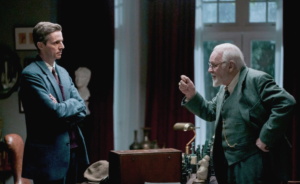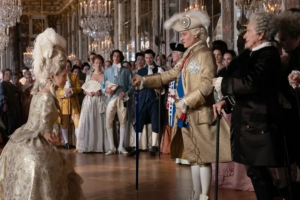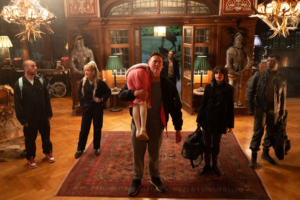THE COLOR PURPLE reviewed by GREG KING
Director: Blitz Bazawule
Stars: Fantasia Barrino, Taraji P. Henson, Danielle Brooks, Colman Domingo, Corey Hawkins, Deon Cole, H.E.R., Halle Bailey, Louis Gossett Jr., Phylicia Pearl Mpasi, Ciara, Jon Batiste, Aunjanue Ellis-Taylor, David Alan Grier, Elizabeth Marvel, Whoopi Goldberg.

Alice Walker’s Pulitzer Prize winning 1982 novel The Color Purple was filmed by Steven Spielberg in 1985. It was regarded as one of his first forays into “serious” filmmaking and was nominated for 11 Oscars. The Color Purple spanned some four decades in the life of Celie Harris, a poor young black girl in rural Georgia, who suffered years of abuse, domestic violence, mental cruelty and poverty at the hands of her brutal husband Mister. But with the help of two strong women – the strong-willed Sophia, who was married to Mister’s oldest son Harpo, and jazz singer Shug Avery – Celie was able to finally beak away from her old life and find freedom and happiness.
The Color Purple was an unrelentingly bleak drama dealing with heavy themes such as race, domestic violence, incest, extreme poverty, defiance, and the thought of it being turned into a Broadway musical seemed somewhat incongruous. In 2005 The Color Purple was brought to the stage with music and lyrics written by Brenda Russell, Alle Wills and Stephen Bray, with the book written by Marsha Norman (‘night, Mother, etc). The play earned 11 Tony nominations and enjoyed a successful run on the Broadway stage from 2005-2008, with a revival in 2015. This film adaptation of the musical has been adapted by television writer Marcus Gradley and directed by Ghanian-born rapper and filmmaker Blitz Bazawule, better known for his collaborations with Beyonce. Among the producers are Oprah Winfrey (who starred in the original film) and Spielberg himself.
Bazawule brings the stage musical to the screen with its powerful narrative largely undiminished. The result is a gritty edged musical that followed Walker’s novel fairly faithfully, but thanks to the musical numbers interspersed throughout it seems a little tonally uneven. The musical numbers blend a vibrant mix of jazz, gospel and blues and attempt to capture that brassy New Orleans vibe, but they contrast with the grim nature of the narrative.
Given Bazawule’s background it’s no surprise that the musical numbers are vibrant and generally well-staged and nicely shot by cinematographer Dan Laustsen (John Wick 2, 3 and 4, etc). But, unlike many recent Hollywood musicals (Wonka, the recent Mean Girls, etc) in which many of the songs are largely unmemorable, here many of the songs are up-tempo. A couple of lively, energetic and well-choreographed numbers take place in the jazz joint that Harpo runs and seem a natural fit, but the staging of some other numbers in the streets do not work as well. One song “Hell No” is a clear standout. But somewhat surprisingly for a musical there are long periods without a song.
The narrative for this musical version closely follows Walker’s novel. Celie (Fantasia Barrino, reprising her role from the stage production) and her sister Nellie (Halle Bailey, from the recent live action remake of The Little Mermaid, etc) are raised by their abusive father Alfonso (Deon Cole). The two girls have a strong connection that helps them survive their father’s cruel ways. Celie gives birth to two babies, fathered by Alfonso, who promptly takes them away from her. She is married off to the vile, monstrous Albert “Mister” Johnson (Colman Domingo, from the Netflix film Rustin, etc), who beats and berates Celie for the slightest infraction of his rules.
When Nellie runs away from home to avoid her father’s sexual advances Celie convinces Mister to let her stay with them. But when Mister attempts to rape Nellie and she resists him he throws her out of the house, forbidding her to have any further contact with Celie. He even hides the letters that Nellie writes to her. It is only Celie’s friendship with Sophia (Danielle Brooks, from the tv series Orange Is The New Black, etc) and Shug (Taraji P Henson, from What Men Want, etc) that gives her the strength to finally stand up to Mister and leave him for a better life.
The cast is excellent here. Making her film debut Barrino is superb as the put-upon Celie and she delivers quite an emotionally demanding and draining performance as she endures incest, abuse and domestic violence. The Oscar-nominated Brooks has a sassy and larger than life presence here and brings plenty of attitude and swagger to her performance. Mister is a monstrous and unsympathetic character and Domingo plays up his unpleasant nature and brutal side with such conviction that he almost becomes a caricature. Henson, who usually plays brash comedy well, is a revelation here. And Whoopi Goldberg, who made her film debut playing Celie in the 1985 film, pops up for a brief cameo here as a midwife.
This musical version of The Color Purple breathes new life into the story, even if the inclusion of upbeat musical numbers into the grim storyline does not always work. This becomes, ultimately, a moving and heartfelt celebration of black women refusing to be beaten down and let their bleak situation break them emotionally or physically.
★★★



